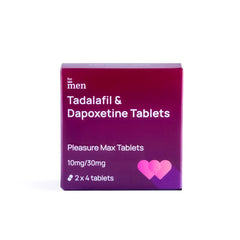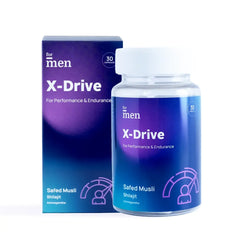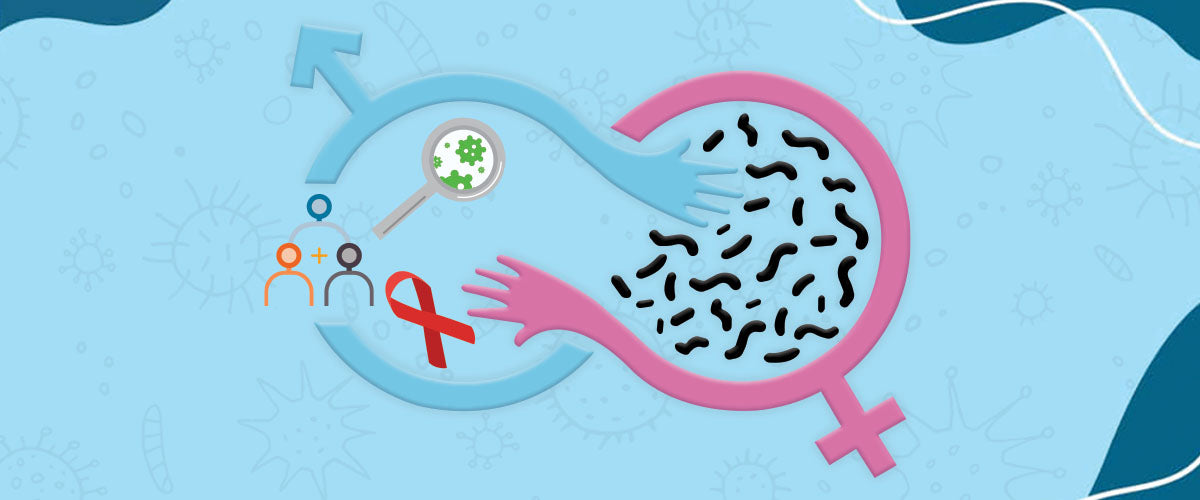Viagra (Sildenafil) Side Effects | How Does Viagra Work?
Evidence Based
All the information in this blog post is accurate, trustworthy, scientifically based and has been written and fact-checked by our experts and doctors.
Our licensed nutritionists and dietitians are committed to being objective, unbiased and honest, presenting all sides of the argument.
This article includes scientific references in brackets, which are clickable links to research papers from reputable academic organizations.

Viagra is a well-known medication that has revolutionized the treatment of erectile dysfunction (ED). It has given hope to millions of men worldwide who face challenges in achieving or sustaining an erection. Although Viagra has been a game-changer in the realm of sexual health, it's crucial to understand what it is, how it works, and the potential side effects associated with its use.
What is Viagra (Sildenafil)?
Viagra is a well-known medication, used for males above 18 years to treat ED. The active ingredient in Viagra is Sildenafil. (An active ingredient that makes the drug work). These drugs come in the form of tablets. It was originally developed as a treatment for hypertension and angina pectoris. However, during clinical trials, researchers discovered its remarkable ability to enhance blood flow to the penis, resulting in improved erectile function.
How Does Viagra Work?
It works by inhibiting the enzyme PDE5, which breaks down a chemical called cyclic guanosine monophosphate (cGMP). Under normal circumstances, cGMP promotes smooth muscle relaxation in the blood vessels of the penis, allowing increased blood flow and, consequently, an erection. By inhibiting PDE5, Viagra prolongs the presence of cGMP, enhancing its effects and facilitating erections when sexual stimulation occurs.
Side Effects of Viagra (Sildenafil):
Almost all medicines have some side effects, which may occur in a small percentage of people. They can range from being mild to severe. The incidence of side effects increases with increasing doses.
Some of the most commonly observed side effects are as follows:
1. Headache
Headaches are a common side effect of Viagra, reported by 16% to 28% of users. The medication's impact on blood vessels throughout the body, not just in the penile region, can lead to changes in blood flow and chemical processes in the brain, resulting in headaches. While these headaches often resolve on their own, if they persist, contact your doctor they may recommend over-the-counter pain relievers or adjustments to the dosage or alternative medications. (Reference)
2. Skin Flushing with Viagra
Approximately 20% of individuals may experience skin flushing after taking Viagra. The medication's impact on blood vessels extends beyond the penile area, causing dilation or widening of blood vessels near the skin's surface. This can result in redness or a warm sensation.
Similar to headaches, skin flushing often resolves on its own. If the flushing is bothersome, consulting your doctor is advisable. Adjustments to the dosage, such as trying a lower dose, may be recommended to minimize flushing and other associated side effects.
3. Nasal Congestion / Stuffy Nose
A stuffy nose after taking Viagra is common due to its impact on sinus blood vessels. This congestion is usually temporary and resolves on its own. While over-the-counter decongestants may seem like a quick fix, they can interfere with Viagra's effects. Home remedies like a hot shower steam are worth trying. If congestion persists, consult your healthcare provider, who may suggest adjusting to a lower Viagra dose.
While it may be tempting to use over-the-counter decongestants for relief, these medications can constrict blood vessels, potentially interfering with the desired effects of Viagra. Instead, consider home remedies such as steam from a hot shower. If nasal congestion persists as an issue, consulting with your doctor is advisable. They may explore options like adjusting to a lower Viagra dose to manage the side effects.
4. Dyspepsia (Upset Stomach):
Viagra enhances blood flow to the penis by relaxing smooth muscle, but this mechanism can also impact smooth muscle in the gastrointestinal tract, leading to an upset stomach. Reports suggest that 3% to 17% of individuals may experience this side effect.
Limiting alcohol consumption can help you get the most out of Viagra because it can make some adverse effects worse, such as upset stomach. consult your doctor or healthcare practitioner if you get heartburn or stomach discomfort after using Viagra. They can guide over-the-counter options that may alleviate these symptoms.
5. Nose Bleeds
Nosebleeds have been noted in certain individuals who use Viagra, possibly linked to increased blood flow to nasal tissues. If you consistently experience nosebleeds after taking Viagra, it's advisable to discuss this with your healthcare physician. They may consider adjusting your dosage or recommending alternative treatments for erectile dysfunction. (Reference)
6. Prolonged Erections:
Viagra enhances blood flow to the penis, but in rare cases, this can lead to a prolonged and painful erection lasting over 4 hours, known as priapism. Seeking immediate medical attention is essential, as untreated priapism can result in permanent damage to the penis. Even though it may be difficult, quick action is necessary in these situations.
7. Low Blood Pressure:
Viagra's blood vessel relaxation can lead to decreased blood pressure, causing symptoms like lightheadedness and weakness, especially if you have a history of low blood pressure or stand up quickly. This effect is most pronounced about one hour after taking Viagra and typically resolves within four hours.
The risk of low blood pressure increases when combining Viagra with blood pressure medications, alpha-blockers, or nitrates. Using Viagra with nitrates or riociguat can result in extremely low blood pressure levels. (Reference)
If you are taking both blood pressure medications and Viagra. Consult a doctor, If you experience any low blood pressure symptoms, and seek immediate medical attention if you feel like you might faint.
8. Vision Changes:
Viagra can also affect an enzyme (protein) that plays a role in how your eyes work. It is rare, but the medicine may cause changes in your vision.
Changes in vision, including blurred vision, light sensitivity, and a potential alteration in color perception, such as a slight blue tinge, are among the anticipated, mild, and short-term effects associated with taking Viagra. Clinical trials have reported abnormal vision changes in 3% to 11% of individuals, with a higher likelihood at elevated doses.
In rare individuals with vision loss in one or both eyes, immediate medical attention is needed, as this could indicate non-arthritic anterior ischemic optic neuropathy (NAION). The risk of NAION is reportedly doubled in men using Viagra, although it remains uncommon. Most cases occurred in individuals with additional risk factors, including age over 50, heart problems, high cholesterol, and a "crowded" optic disc.
Alternate Drugs to Viagra
Various alternative medications are accessible for treating erectile dysfunction (ED), and some may suit your needs better than others. If you're considering options beyond Viagra, discuss them with your doctor. They can provide information about alternative medications that might be more suitable for your specific situation.
Examples of Other Drugs Used to Treat ED Include:
1. Tadalafil (Cialis)
Consider trying ForMen's Get Hard Tablets, featuring Tadalafil 10mg as a viable alternative to Viagra (sildenafil) for treating erectile dysfunction (ED). This fast-acting and long-lasting solution is designed to provide effective results without causing side effects. With just one tablet, you can experience the benefits within 1-2 hours. prescribed by doctors and formulated with clinically validated ingredients, it is a reliable choice for addressing ED in men. Know the differences between Tadalafil and Sildenafil before using them.
2. Vardenafil (Levitra)
3. Avanafil (Stendra)
4. Alprostadil
Viagra's impact on erectile dysfunction is substantial, but potential side effects require informed decisions with healthcare professionals. Based on personal preferences and health reasons, it may be good to explore the alternatives.
Also Read the Articles:
- Can We Use Tadalafil Tablets for Erectile Dysfunction?
- How to Cure Erectile Dysfunction (ED) and Premature Ejaculation (PE) Naturally?
- Tadalafil + Dapoxetine: Benefits and Side Effects
- Fitness Solutions: Unlocking the Top 4 Exercises for Erectile Health
| *** This Article is Written by Swetha Ramala. |
Disclaimer: The information provided on this page is not a substitute for professional medical advice, diagnosis, or treatment. If you have any questions or concerns about your health, please talk to a healthcare professional.

 Evidence Based
Evidence Based






Leave a comment